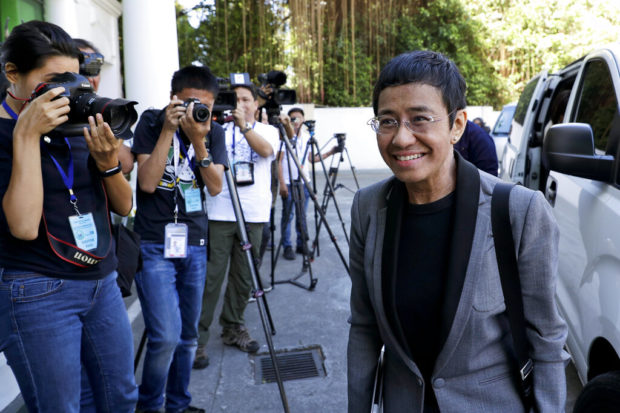
In this April 3, 2019 file photo, Rappler CEO and Executive Editor Maria Ressa arrives at the Court of Tax Appeals in Manila. (AP Photo/Aaron Favila, File)
MANILA, Philippines- United Nations Special Rapporteur Irene Khan on Monday asked the Supreme Court to allow her to share her insights on the cyber libel case of Rappler Chief Executive Officer and Nobel Laureate Maria Ressa and former Rappler researcher Reynaldo Santos Jr.
Khan’s expertise is on the Promotion and Protection of the Right to Freedom of Opinion and Expression.
Ressa and Santos were convicted by the Manila Regional Trial Court on June 15, 2020 for a cyber libel case filed by businessman Wilfredo Keng.
“She (Khan) just wanted to be allowed to appear as an amicus curiae and for her submission to be admitted by the court. She is seeking the court’s permission for this purpose,” Dean Rodel Taton of the Graduate School of Law San Sebastian College Recoletos-Manila said when they filed the motion to intervene.
Taton said while an amicus curiae or ‘friend of the court” is usually invited by the court to provide insights on a case, Khan hopes to be allowed by the magistrates to intervene as an expert in Ressa’s case.
Being appointed by the UN Human Rights Council, Khan has been accorded certain privileges and immunities to gather relevant information regarding violations of right to freedom of opinion and expression.
In a briefer provided to reporters, it said that Khan is concerned that domestic law “fails to adequately protect the right to freedom of opinion and expression under the International Covenant on Civil and Political Rights.”
Manila is among the signatories to the international covenant.
“In particular, the Cybercrime Prevention Act raises serious concerns that it limits the ability of journalists to expose, document and address issues of important public interest, thereby violating the right to receive and impart information,” the briefer stated.
It was referring to the Cybercrime Prevention Act passed in 2012.
Ressa elevated her case to the Court of Appeals but it denied her appeal, prompting her to take her case to the Supreme Court.
RELATED STORIES:
CA affirms cyber libel conviction of Rappler CEO Ressa, ex-writer
Ressa’s counsel Amal Clooney urges SC, Marcos gov’t to defend free press
How the Court of Appeals ruled on Maria Ressa’s cyber libel case